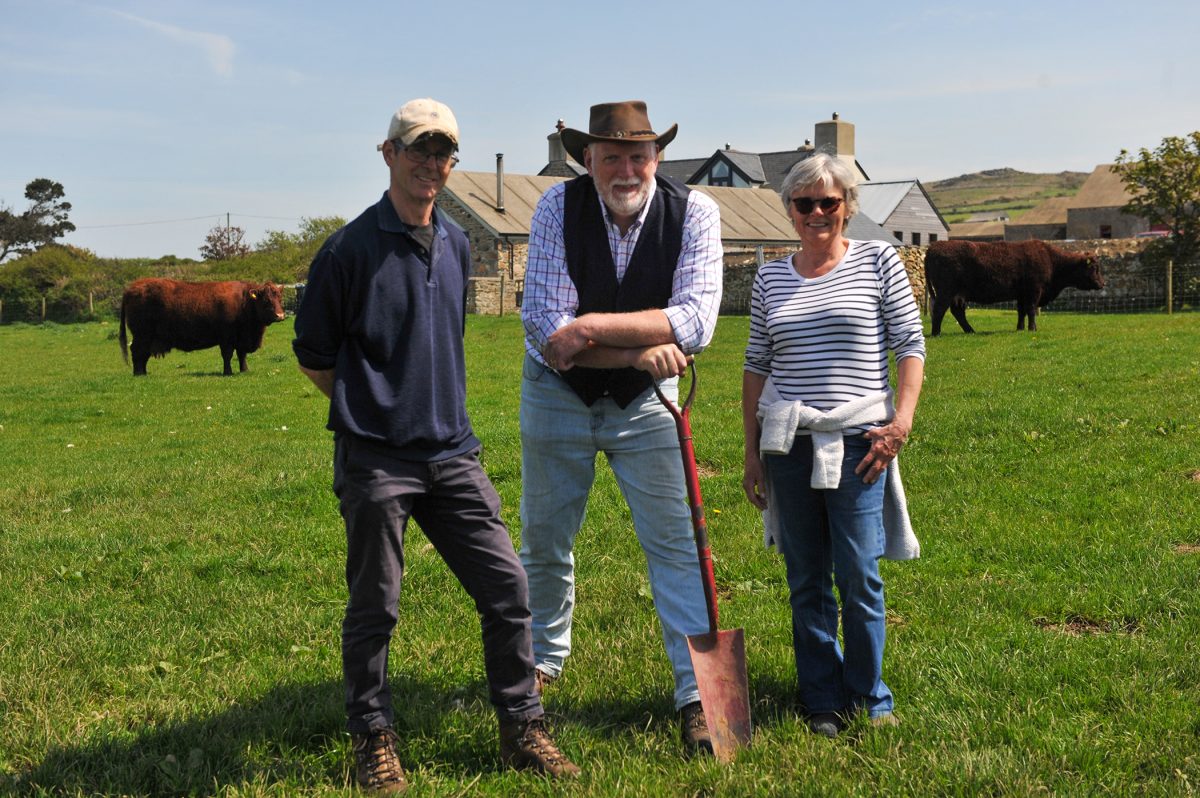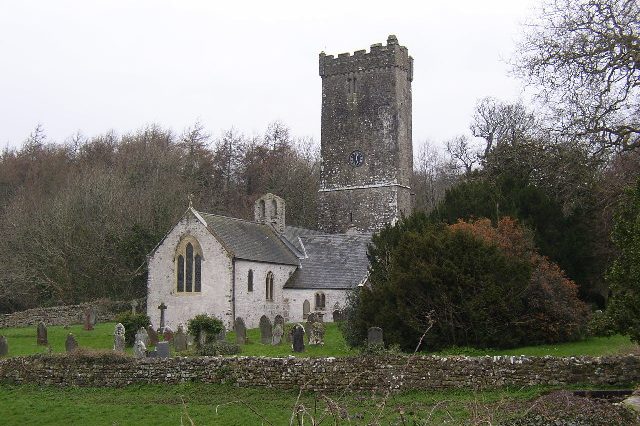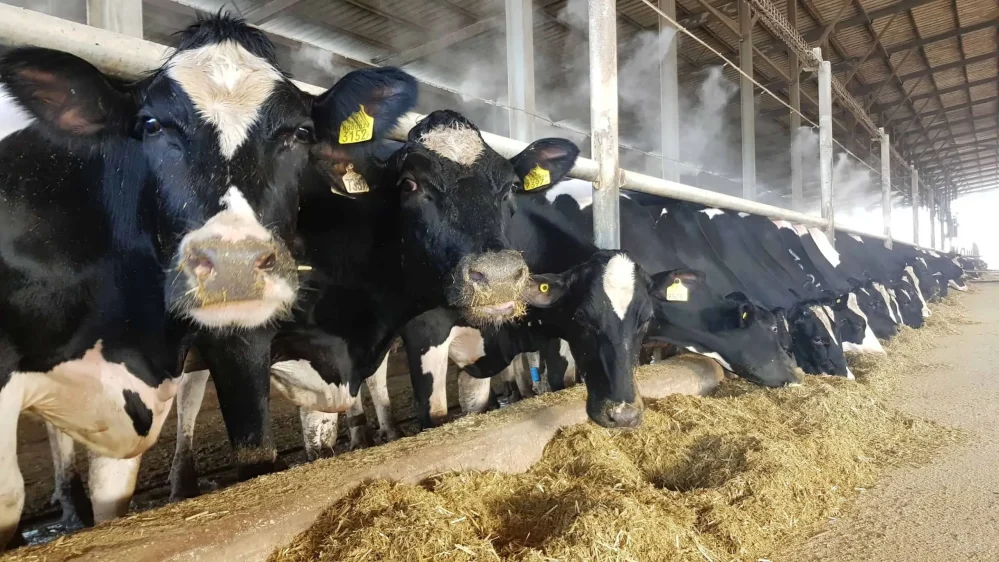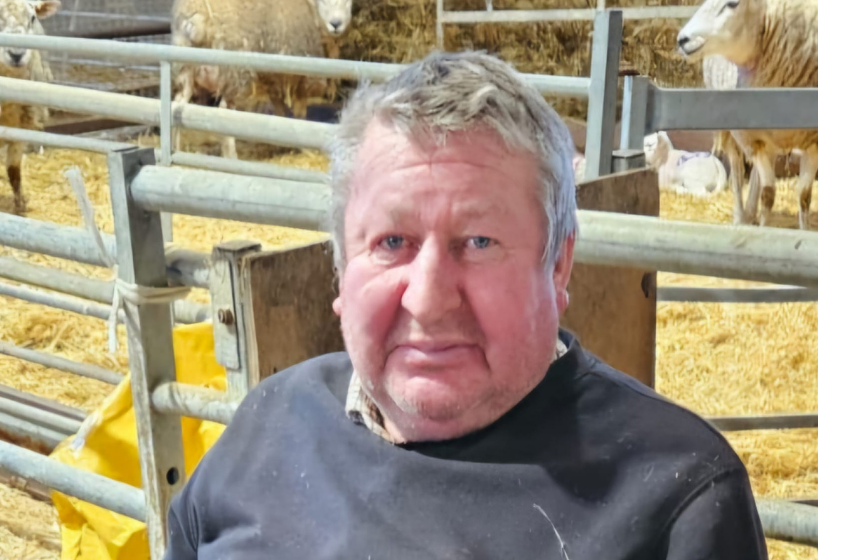Farming
Why every Welsh farm should set a goal to increase soil organic carbon

REDUCING soil disturbance, growing cover crops and increasing plant diversity will help Welsh farms better cope with future climate challenges.
As the industry moves towards utilising more sustainable food production techniques, the goal of every farm should be to increase soil organic carbon, insists Neil Fuller, an expert in the science of soil management.
At a recent Farming Connect soil health event at Treathro Farm, a beef farm near Strumble Head, Pembrokeshire, where David and Debbie Best are trialling different soil management practices, Mr Fuller said soil health offered significant sustainability and productivity outcomes for farm businesses.
As a starting point, he recommended getting an active measurement of the health of farm soils – its biological, physical and chemical health.
From microscopic fungi and bacteria to earthworms and beetles, soil contains billions of organisms.
“Most are beneficial to crops and perform a variety of functions, from breaking down organic matter and improving soil structure and drainage,’’ said Mr Fuller.
Many will also act as predators for pests, reducing the need for chemicals.
Earthworms are good indicators of soil health as they are sensitive to pH, waterlogging, compaction, rotations, tillage and organic matter.
Their numbers and distribution across a field can reveal what is going on under the surface.
Mr Fuller brought this message to life with a ‘soil safari’ by examining different soils and worm activity under a high-powered microscope and shared on a big screen.
Farm soils should have three types of earthworms – surface, topsoil and deep-burrowing earthworms.
Small surface worms live and feed on surface litter and organic amendments, topsoil earthworms are found in the topsoil, forming horizontal burrows that mix the soil and mobilise nutrients, and deep-burrowing earthworms make deep, vertical burrows.
While most soils have topsoil worms, the absence of surface and deep-burrowing worms suggest that the soil has been overworked and soil functioning is compromised.
Mr Fuller said the physical structure of the soil also needs to be considered.
If soil is compacted, there is less room for plant roots to grow and for air and water to circulate.
Compacted soils have lower infiltration and drainage rates, as well as reduced biological activity, plant root growth and yields.
They are also less able to cope with weather extremes, warned Mr Fuller.
Chemical properties are also important to soil health. Maintaining the optimum pH level and adequate supply of plant nutrients helps to support crop growth.
At Treathro, the Bests are working with Farming Connect to examine the impact of different management techniques and sward types on soil microbiology.
There are four trial fields: in one the Bests are rotational grazing their Red Devon suckler herd on permanent pasture and in another they intend to grow a minimum tillage herbal ley.
The other two trial sites are a field of perennial ryegrass and white clover used for haylage and a cliff-top field that is an SSSI and only lightly grazed by ponies.
Non Williams, Farming Connect Carbon Specialist Officer, said the average soil carbon stock in the top 10cm of soil was founds to be highest in the cliff top field, at 62.2 tonnes a hectare (t/ha), while in the rotationally grazed permanent pasture it was 51t/hectare (ha).
In the field used for haylage, it was 45.7t/ha and 41.7t/ha in remaining field.
Dr Williams said that at greater soil depth, 30-50cm below ground, the average soil carbon stock was highest – 30.4t/ha – in the perennial ryegrass and clover field used for haylage.
The project is also examining the levels of beneficial bacteria, fungi, protozoa and nematodes in the soil at Treathro.
Lynfa Davies, Farming Connect Biodiversity Specialist Officer, said this had shown that there were very dominant levels of beneficial bacteria.
Ideally fungi levels should be higher but she suggested low levels were typical of many agricultural soils.
“This can be improved through regenerative practices such as using deep-rooted leys using min-till methods which allow fungi to proliferate,’’ said Ms Davies.
Using less artificial fertilisers and increasing soil carbon will also help, she added.
But she warned that improving soil health is not a rapid process.
“It is important to remember that building soil health takes time and it may take several years before significant changes are seen,’’ said Ms Davies.
Farming
Farm building scheme near Lawrenny given go-ahead by planners

AN APPLICATION for a storage building at a south Pembrokeshire farm, made by a family member of an officer on Pembrokeshire County Council’s planning service, has been given the go-ahead by the authority’s planning committee.
In an application recommended for approval at the July 23 meeting of the authority’s planning committee, Laura Elliot sought permission for the erection of an agricultural storage building at Tedion Farm, a dairy farm near Lawrenny.
The application had been brought to committee, rather than being delegated to planning officers, due to the family connection.
The farm, near to the Pembrokeshire coast National Park border, comprises 270 milking cows and dairy heifer replacements kept on the farm comprising land over 138 hectares. The farm is mainly down to grass and the cows are paddock grazed in order to utilise grass efficiency.
No objections had been received from local community council Martletwy.
A report for members said: “The application seeks consent for the erection of agricultural storage building. The erection of an agricultural building will be used to store stay, hay and farm machinery.
“The building would be located within the existing farm complex, to the north-east of the site, adjacent to the main farm dwelling. The building will measure 18 metres in length by 13.6 metres in width, with a pitched roof height of 5.71 metres.”
Approval was moved by Cllr Alistair Cameron, seconded by Cllr Brian Hall.
Farming
Fears dairy farm near Kilgetty could increase to 3,000 cattle

PEMBROKESHIRE planners are to visit the site of one of the county’s largest dairy farms after claims were raised a scheme for new calf buildings could lead to animal welfare issues and an increase in the size of the herd to 3,000 cattle.
At the July 23 meeting of the council’s planning committee, an application by Hugh James of Langdon Mill Farms Ltd for a calf building, weaned calf building, and associated yard areas, at Langdon Mill Farm, near Jeffreyston, Kilgetty was recommended for conditional approval.
Local community council Jeffreyston has raised concerns, made by a member of the public, on potential increased noise and odour from the scheme, planners heard.
A supporting statement, through agent Reading Agricultural Consultants, said: “The holding currently has a milking herd of approximately 2,000 cows, which are housed indoors for the majority of the year, with dry cows [cows that are not lactating, prior to calving] and heifers grazed outdoors when weather and soil conditions permit.
“There has been significant investment in buildings and infrastructure at the farm over the last decade in respect of cattle accommodation, slurry storage, milking facilities, Anaerobic Digestion (AD) plant and feed storage. The unit is efficient, achieving yields of more than 10,000 litres/cow/year, with cows being milked three times/day in the 60-point rotary parlour.”
Currently, calves are reared at Langdon Mill Farm for two months before being transported off-site to be reared at a number of third-party farms in the area before being return later; the proposed 61.2m long calf building is required to accommodate young-stock, following separation from the cows, to two-months, with the 164.8m weaned calf building to be used for calves from two months to seven months.
The application says the proposals would “clearly make the enterprise more financially robust by reducing reliance on third party farms”.
However, concerns were raised at the committee meeting by objector Ian Dennis, a former vet of some four decades’ experience, who described Langdon as occupying 3,000 acres of land with 2,000 cattle currently that “are never allowed to graze,” the proposal, he said, would add another 1,000 cattle to the site.
“This is factory farming, an intensive livestock unit, no longer a farm.”
He told planners a “mendacious and incorrect” ammonia emission report submitted by the applicants was “designed to bamboozle,” saying, despite his experience and scientific background, he needed expert support to assess.
He said only average figures were reported, rather than peaks and troughs, adding the “fictitious anaerobic digestion plant” had yet to be built, with planning permission now lapsed.
However, officers told members the applicant’s agent had said works on the digestor had actually started.
On the issue of animal welfare, Mr Dennis said he had “very huge concerns” about the scale of the development, differing from a planning officer report saying the scheme would bring animal welfare benefits.
A suggestion by committee chair Cllr Simon Hancock the application be deferred pending a site visit was unanimously backed by committee members present.
Farming
Family pay tribute to farmer, 65, who died in quadbike accident

A WEST WALES farmer has died after an incident involving a quadbike.
Dyfed-Powys Police have confirmed they attended a report of an incident involving an agricultural quadbike in a field in the Llanilar area of Aberystwyth on July 17.
The force has confirmed that a 65-year-old man died at the scene.
They said that his next of kin have been advised and are being supported by specialist officers. The HM Coroner and Health and Safety Executives have been informed.
His family have paid tribute to him. The family said: “Hugh Tudor was a 65 year old farmer who had farmed at Tynberllan, Llanilar with his wife Ann for over 40 years. He was a devoted father to Sara, Lowri and the late Gwenno.
“Hugh was the son of the late Tom and Sybil Tudor of Glanystwyth and brother to Richard.
“Farming was his life, but he also had a wide range of interests and was actively involved in all aspects of the local community in Llanilar and beyond.
“We would like to thank everybody for their support and kindness during this difficult time.”
-

 Education5 days ago
Education5 days agoMilford Tesco worker achieves Oxford dream and lands top legal job
-

 Crime4 days ago
Crime4 days agoHaverfordwest man admits having nearly 1000 child and animal images
-

 Crime4 days ago
Crime4 days agoYouth set to appear in court over serious sexual offences
-

 Crime4 days ago
Crime4 days agoPolice investigating after man injured during altercation in cemetery
-

 Education4 days ago
Education4 days agoPupils delight in ice cream treat from Pembrokeshire’s number one van
-

 Crime4 days ago
Crime4 days agoTown centre ‘stinking of skunk’ as police strip cannabis farm
-

 Crime3 days ago
Crime3 days agoFag-butt police court summonses spark debate in Pembrokeshire
-

 News6 days ago
News6 days agoProposal to give firefighters a council tax discount to go to Cabinet






























